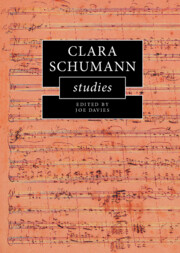Book contents
- Clara Schumann Studies
- Cambridge Composer Studies
- Clara Schumann Studies
- Copyright page
- Dedication
- Contents
- Figures
- Tables
- Music Examples
- Contributors
- Acknowledgements
- Introduction: Clara Schumann in the Musicological Imagination
- 1 Clara and Robert Schumann’s Circles in Dresden
- 2 Disillusionment and Patriotism
- 3 Softened, Smudged, Erased
- 4 A Way with Words
- 5 Clara Schumann and the Nineteenth-Century Piano Concerto
- 6 Clara Schumann and Bach
- 7 Formal Innovation and Virtuosity in Clara Schumann’s Piano Trio in G minor, Op. 17
- 8 Contextualizing Clara Schumann’s Romanzen
- 9 The Young Prophetess in Performance
- 10 Clara Schumann’s Compositional and Concertizing Strategies, and Robert Schumann’s Piano Sets
- 11 Clara: Robert’s Posthumous Androgyne
- 12 Clara Schumann, ‘Clara Schumann’ and the American Press
- 13 Clara Schumann’s Legacy As a Teacher
- Select Bibliography
- Index
13 - Clara Schumann’s Legacy As a Teacher
Published online by Cambridge University Press: 25 November 2021
- Clara Schumann Studies
- Cambridge Composer Studies
- Clara Schumann Studies
- Copyright page
- Dedication
- Contents
- Figures
- Tables
- Music Examples
- Contributors
- Acknowledgements
- Introduction: Clara Schumann in the Musicological Imagination
- 1 Clara and Robert Schumann’s Circles in Dresden
- 2 Disillusionment and Patriotism
- 3 Softened, Smudged, Erased
- 4 A Way with Words
- 5 Clara Schumann and the Nineteenth-Century Piano Concerto
- 6 Clara Schumann and Bach
- 7 Formal Innovation and Virtuosity in Clara Schumann’s Piano Trio in G minor, Op. 17
- 8 Contextualizing Clara Schumann’s Romanzen
- 9 The Young Prophetess in Performance
- 10 Clara Schumann’s Compositional and Concertizing Strategies, and Robert Schumann’s Piano Sets
- 11 Clara: Robert’s Posthumous Androgyne
- 12 Clara Schumann, ‘Clara Schumann’ and the American Press
- 13 Clara Schumann’s Legacy As a Teacher
- Select Bibliography
- Index
Summary
Clara Schumann’s pedagogical significance has long been acknowledged. Her influence transcended her pupils, shaping not only piano performance, but concert culture and, indeed, the understanding of music’s aesthetic role, for over a century. From a music-historiographical perspective, scholars have argued for a more nuanced understanding of Schumann’s overlapping identities as pianist, composer, teacher, wife and mother. This arises from the belief that to understand a musician holistically is to understand all their activities, and the relationships these engender with families, colleagues, friends, teachers, students, audiences and critics (what Beatrix Borchard conceives as ‘constellations’ or networks), while acknowledging that no single account can fill all the gaps. Adopting Borchard’s ‘constellation’ approach to history, which reveals much about the structures of power conveyed by the teacher–pupil relationship, this chapter explores the perception of Schumann’s teaching legacy in the British reception of two famous pupils: Fanny Davies and Leonard Borwick. It examines how these pianists’ reputations overlapped with that of Schumann, according to their gender, nationality, repertoire and image. In doing so, it shows how these teacher–pupil relationships were simultaneously compressed (by the forces of critical writing) and stretched (by the individuality of each musician).
- Type
- Chapter
- Information
- Clara Schumann Studies , pp. 271 - 291Publisher: Cambridge University PressPrint publication year: 2021

